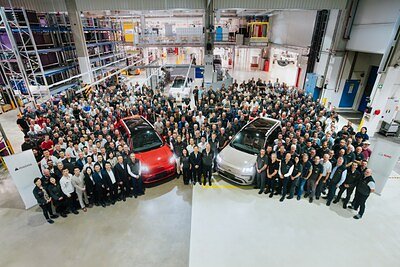
GAC's European Push: Localized EV Production Signals a Shifting Automotive Landscape
Chinese automaker GAC partners with Magna International to build EVs in Austria, aiming to disrupt the European market with competitive pricing and a growing presence. Is this the start of a new era for automotive manufacturing?
GAC's European Push: Localized EV Production Signals a Shifting Automotive Landscape
NEW YORK, NY – November 21, 2025
A New Force in European Automotive?
The European automotive landscape is bracing for increased competition as Chinese manufacturer GAC Group accelerates its entry into the market. In a strategic move, GAC has partnered with Canadian automotive supplier Magna International to manufacture its AION V electric SUV at Magna’s facility in Graz, Austria. This collaboration isn't simply about expanding production capacity; it’s a calculated strategy to navigate European tariffs, reduce supply chain complexities, and establish a strong foothold in a fiercely competitive market.
“The European market is crucial for GAC’s long-term growth,” says an industry analyst. “Local production addresses the tariff concerns and allows them to respond much faster to changing consumer demands.” This move signals a broader trend of Chinese automakers looking beyond their domestic market and challenging established players in Europe.
Localized Manufacturing: A Key to EV Success?
For GAC, localized manufacturing isn't just about cost savings. It’s about agility and responsiveness. As the demand for electric vehicles surges across Europe, automakers are increasingly recognizing the need for flexible and efficient production processes. Magna’s Graz facility offers precisely that. With the capability to produce internal combustion engine vehicles, hybrids, and EVs on the same production lines, Magna provides GAC with the scalability and versatility needed to adapt to shifting market demands.
“Magna’s expertise in contract manufacturing is invaluable for emerging EV brands,” explains a manufacturing expert. “It allows them to scale production without the massive capital investment of building their own factories.” Magna’s decision to partner with both GAC and XPeng demonstrates its growing prominence as a key manufacturing partner for electric vehicle companies globally. The Graz facility's ability to handle multiple vehicle types further cements its strategic importance. The partnership allows GAC to bypass potential import duties and logistical hurdles, providing a competitive edge in pricing.
Beyond Tesla: Diversifying the European EV Market
The arrival of the AION V introduces another viable option for European consumers seeking electric vehicles. With a five-star Euro NCAP safety rating, a WLTP range of approximately 510 kilometers, and a starting price around €35,990, the AION V positions itself as a competitive alternative to established models like the Volkswagen ID.4, Skoda Enyaq, and Tesla Model Y.
“Consumers are looking for a wider range of choices, especially in the EV segment,” says an automotive reviewer. “The AION V offers a compelling combination of safety, range, and price.” The vehicle's interior boasts a 14.6-inch touchscreen, digital instrument panel, and advanced driver-assist systems, bringing it in line with current consumer expectations. GAC’s commitment to an 8-year vehicle warranty and 3 years of free roadside assistance further enhances its appeal. The AION V is not simply trying to compete on price; it’s aiming to offer a well-equipped and reliable EV experience. While Tesla currently dominates the European EV market, increasing competition from both established automakers and new entrants like GAC is forcing innovation and driving down prices, ultimately benefiting consumers.
While GAC has launched the AION V in Finland, Poland, and Portugal, concrete sales figures remain largely undisclosed. However, the company’s ambitious goal of selling over 50,000 units annually in Europe by 2027 suggests a strong commitment to long-term growth. GAC’s cautious approach to market entry, focused on building robust dealer and service networks, indicates a sustainable strategy focused on customer satisfaction and brand loyalty. The company acknowledges the importance of establishing a strong presence beyond simply selling vehicles; building trust and providing comprehensive after-sales support are crucial for success in the European market.
